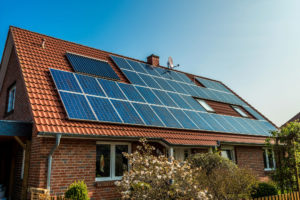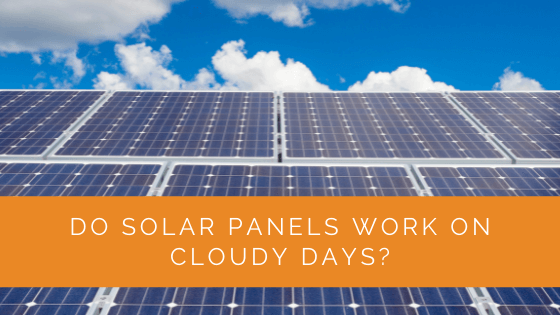Solar panels generate electricity by taking in the sun’s rays and converting sunlight into electrical energy. This conversion occurs in the solar panel system and is then supplied to homes and offices.
However, many people doubt how solar panels work on cloudy days. Since we already know solar panels require sunlight to function, this appropriate question frequently crosses our minds.
Solar cells are made to absorb photons from the light they receive during the day. These photons are then converted into electricity. Continue reading to find out how these solar panels absorb photons on cloudy days and if cloudy weather affects their performance.
Contents
- 1 Key Takeaways
- 2 Can Solar Panels Generate Electricity on Cloudy Days?
- 3 What Is the Edge of Cloud Effect?
- 4 How Do Solar Panels Work?
- 5 Case Study: Enhancing Solar Energy Utilisation in Cloudy Climates
- 6 Expert Insights From Our Solar Panel Installers About Solar Panel Performance on Cloudy Days
- 7 Discover the Power of Solar with Solar Panels Network
- 8 To Conclude With
Key Takeaways
- Solar panels can generate electricity on cloudy days, although their efficiency may be reduced compared to sunny days.
- Solar panels can store excess energy in batteries, allowing homeowners to use stored energy during cloudy periods.
- The “edge of cloud effect” suggests that solar panels can work more efficiently and produce more electricity when indirect sunlight passes over the edge of clouds. However, this is most effective with only a few clouds in the sky.
Can Solar Panels Generate Electricity on Cloudy Days?
The short answer to this question is yes; solar panels can generate electricity on cloudy days. Solar panels do not always need direct sunlight to work and to produce electrical energy. Their primary energy source is sunlight, which is present on cloudy days, too.
The intensity of sunlight can affect the efficiency with which solar panels produce electricity. For instance, your solar panel installation will generate significantly less than its normal power output on a cloudy day.
You will experience a reduction in energy production on cloudy days. However, this does not mean you must resort to other power sources for electricity supply. Solar panels have batteries that can store excess energy generated during the day.
You can use these energy reserves from your solar battery storage when your panels are not functioning at their 100% efficiency. These solar batteries are a blessing as they reduce your electricity bills and completely nullify the use of
If you live in a region where you do not receive enough light from the sun during some parts of the year, you might want to devise a few backup solutions. Net metering is usually an excellent way to cover the required electricity demand in your home.
What Is the Edge of Cloud Effect?
While the common notion suggests that a solar system produces less energy on a cloudy day, there are theories to counter this point. For instance, the cloud effect suggests that solar panels work with higher efficiency and produce more electricity in the presence of indirect sunlight.
Solar panels absorb sunlight and use photons to generate energy. The cloud effect is when sunlight passes over the edge of clouds. This particular angle of refraction magnifies the intensity of the peak sunlight.
As this refracted light falls on the solar panels, the solar cells get to work and start producing electricity. They produce more power than they would generate on a bright day. However, this is only possible if only a few clouds are in the sky.
A dense overcast is unsuitable for a solar panel or solar PV system. A few clouds compensate for the lost solar power by refracting sunlight and making it more intense.

How Do Solar Panels Work?
We know solar panels work during the day, and the general rule suggests they do not work at night. However, a common misconception suggests that light from the sun is essential for these panels to work.
While this is true to a certain extent, you do not need direct sunlight for solar power. Electrical current runs in the form of direct current in the solar panels. They work on cloudy days with a reduced efficiency because solar panels only need daylight to function and not direct light from the sun.
Daylight has photons essential for the production of electrical current. While your solar panels may not generate excess power on a dull day, the panels work on cloudy days just fine!
Case Study: Enhancing Solar Energy Utilisation in Cloudy Climates
Background
At Solar Panels Network, we frequently encounter clients concerned about the performance of their solar systems in the UK’s often cloudy climate. While solar energy is indeed most efficient under direct sunlight, we aim to educate our clients on the capability of modern solar panels to function effectively even on cloudy days. This case study highlights our approach to optimising solar energy production for a residential client living in an area known for frequent overcast weather.
Project Overview
The primary objective was to install a solar system that maximises energy capture and efficiency, even in less-than-ideal weather conditions. The client’s location in the northern UK presented a unique challenge due to limited direct sunlight during certain seasons. Our goal was to ensure the solar system met the household’s energy needs consistently throughout the year.
Implementation
- System Design and Planning:
- We conducted a detailed assessment of the client’s energy needs and available roof space. The system was designed to include high-efficiency solar panels capable of capturing diffuse light.
- A solar battery storage system was integrated to store excess energy produced during sunnier days, ensuring a steady supply during cloudy periods.
- Panel Selection:
- High-efficiency monocrystalline panels were chosen for their superior performance in low-light conditions. These panels are known for their ability to produce more power per square meter than other types.
- Panels were strategically positioned to capture maximum daylight, taking advantage of the sun’s path throughout the year.
- Monitoring and Maintenance Plan:
- We installed a monitoring system to track the system’s performance, allowing real-time adjustments and optimisations.
- A regular maintenance schedule was established to ensure the panels remained clean and free of debris, which can significantly affect performance, especially in areas with frequent precipitation.
Results
- Consistent Energy Production: The system consistently produced adequate power to meet the household’s needs, even during months with fewer sunny days. The battery system proved crucial in balancing the supply during less productive periods.
- Increased Efficiency During Cloud Cover: The installation benefited from the ‘edge of cloud effect,’ with occasional surges in energy output during partly cloudy conditions.
- Cost Savings: The client reported significant reductions in their electricity bills, with the solar system covering a substantial portion of their energy consumption. The investment in a battery system further reduced their reliance on the grid.
Summary
This case study demonstrates that solar panels are a viable energy solution even in cloudy climates. Through careful selection of panel type, strategic placement, and the inclusion of a battery storage system, we ensured consistent energy production and significant cost savings for our client. The success of this project highlights the adaptability of solar technology to various environmental conditions, making it a reliable choice for households across the UK.
Expert Insights From Our Solar Panel Installers About Solar Panel Performance on Cloudy Days
Many homeowners worry that their solar panels won’t generate enough electricity on cloudy days, but that’s a common misconception. Even on overcast days, solar panels can still capture diffuse sunlight and produce energy. The efficiency might drop, but the system doesn’t stop working.
Solar Installation Expert
One interesting phenomenon is the ‘edge of cloud effect,’ where sunlight refracts around clouds, intensifying as it reaches the panels. This can sometimes lead to brief spikes in energy production, which compensates for less sunny periods.
Solar Energy Analyst
Having a battery storage system is a great way to ensure you have power even on cloudy days. Batteries store excess energy produced on sunnier days, which can then be used during periods of lower solar production.
Renewable Energy Consultant
Discover the Power of Solar with Solar Panels Network
Are you navigating the world of solar installations? Look no further than Solar Panels Network, the UK’s trusted partner in harnessing the sun’s potential. Our dedication goes beyond just installations; we’re on a mission to transform how homeowners and businesses across the UK perceive and utilise energy. By choosing us, you’re reducing your carbon footprint and making a smart financial move that promises savings for years ahead. Contact us today and embark on your solar journey.
To Conclude With
Solar panels work in almost any weather condition. Rain, snow, and even hail cannot prevent you from getting solar energy. So the short answer is yes, they work on cloudy days and cold temperatures. Households run on renewable and sustainable energy today due to technological advancements.
You can use a solar PV system no matter where you live, producing ample energy to power your homes easily. You can also install a solar battery if you want to save the solar energy generated later. This way, your household will be without power for fewer hours.
About the Author
Solar Panels Network stands at the forefront of solar energy solutions, driven by a team of seasoned solar engineers and energy consultants. With over decades of experience in delivering high-quality solar installations and maintenance, we are committed to promoting sustainable energy through customer-centric, tailored solutions. Our articles reflect this commitment, crafted collaboratively by experts to provide accurate, up-to-date insights into solar technology, ensuring our readers are well-informed and empowered in their solar energy decisions.

